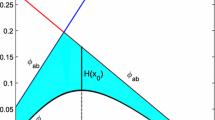Abstract
In this paper we provide new insights on the method for computing Markov perfect Nash equilibria presented for the first time in [12]. This method does not use the Hamilton—Jacobi—Bellman equations, but characterizes Markov perfect equilibria by means of a system of quasilinear partial differential equations. A quasilinear system is much more amenable than a fully non-linear system of partial differential equations as the Hamilton—Jacobi—Bellman system usually is. This fact allows us to establish results on existence and uniqueness of solutions and also to derive its analytical expressions in some cases. Otherwise, this approach simplifies a qualitative analysis, making possible the application of well—known numerical routines to find an approximate Nash equilibrium. The main features of the method are shown in the analysis of some competitive resource games.
Access this chapter
Tax calculation will be finalised at checkout
Purchases are for personal use only
Preview
Unable to display preview. Download preview PDF.
Similar content being viewed by others
References
Bourdache—Siguerdidjane, H. and Fliess, M. (1987) Optimal Feedback Control of Nonlinear Systems, Automatica 23, 365–372.
Clemhout, S. and Wan, H.Y. (1994) Differential Games — Economic Applications, in Handbook of Game Theory, Edited by R.J. Au-mann and S. Hart, North Holland, Amsterdam, Holland, Vol. 2, 801–825.
Courant, R. and Hilbert, D. (1989) Methods of Mathematical Physics, Vol. 2, Wiley, New York, New York.
Dockner, E.J., Feichtinger, G. and Jorgensen, S. (1985) Tractable Classes of Nonzero-Sum Open-Loop Nash Differential Games, Journal of Optimization Theory and Applications 45, 179–198.
Dockner, E.J. and Sorger, G. (1996) Existence and Properties of Equilibria for a Dynamic Game on Productive Assets, Journal of Economic Theory 71, 209–227.
Dockner, E.J., Jorgensen, S., Van Long, N. and Sorger, G. (2000) Differential Games in Economics and Management Science, Cambridge University Press, Cambridge, U.K.
Fershtman, C. (1987) Identification of Classes of Differential Gamesfor Which the Open Loop Is a Degenerate Feedback Nash Equilib-rium,Journal of Optimization Theory and Applications 55, 217–231.
Friedman, A. (1971) Differential Games, Wiley, New York, New York.
John, F. (1971) Partial Differential Equations, Springer Verlag, New York, New York.
Leitmann, G. (1974) Cooperative and Non-cooperative Many - Players Differential Games, Springer Verlag, New York, New York.
Melhmann, A. (1988) Applied Differential Games, Plenum Press, New York, New York.
Rincón-Zapatero, J.P., Martínez, J. and Martín-Herrán, G. (1998) New Method to Characterize Subgame Perfect Nash Equilibria in Differential Games, Journal of Optimization Theory and Applications 96, 377–395.
Rincón-Zapatero,J.P.,Martín-Herrán, G. and Martínez, J. (1998) Identification of Efficient Subgame-Perfect Nash Equilibria in a Class of Differential Games,Journal of Optimization Theory and Applications 104, 235–242.
Rincón—Zapatero, J.P. (2002) Characterization of Markovian Equilibria in a Class of Differential Games, submitted.
Sorger, G. (1998) Markov—Perfect Nash Equilibria in a Class of Resource Games,Economic Theory 11, 79–100.
Editor information
Editors and Affiliations
Rights and permissions
Copyright information
© 2002 Springer Science+Business Media New York
About this chapter
Cite this chapter
Martín-Herrán, G., Rincón-Zapatero, J.P. (2002). Computation of Markov Perfect Nash Equilibria without Hamilton—Jacobi—Bellman Equations. In: Zaccour, G. (eds) Optimal Control and Differential Games. Advances in Computational Management Science, vol 5. Springer, Boston, MA. https://doi.org/10.1007/978-1-4615-1047-5_9
Download citation
DOI: https://doi.org/10.1007/978-1-4615-1047-5_9
Publisher Name: Springer, Boston, MA
Print ISBN: 978-1-4613-5368-3
Online ISBN: 978-1-4615-1047-5
eBook Packages: Springer Book Archive




